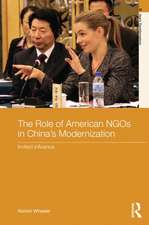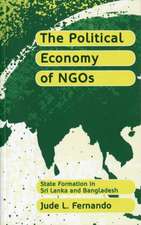Social Organizations and the Authoritarian State in China
Autor Timothy Hildebrandten Limba Engleză Paperback – 7 oct 2015
| Toate formatele și edițiile | Preț | Express |
|---|---|---|
| Paperback (1) | 283.41 lei 6-8 săpt. | |
| Cambridge University Press – 7 oct 2015 | 283.41 lei 6-8 săpt. | |
| Hardback (1) | 691.66 lei 6-8 săpt. | |
| Cambridge University Press – 17 feb 2013 | 691.66 lei 6-8 săpt. |
Preț: 283.41 lei
Nou
Puncte Express: 425
Preț estimativ în valută:
54.23€ • 56.26$ • 45.22£
54.23€ • 56.26$ • 45.22£
Carte tipărită la comandă
Livrare economică 27 martie-10 aprilie
Preluare comenzi: 021 569.72.76
Specificații
ISBN-13: 9781107454231
ISBN-10: 1107454239
Pagini: 236
Ilustrații: 6 b/w illus. 8 tables
Dimensiuni: 152 x 229 x 14 mm
Greutate: 0.35 kg
Editura: Cambridge University Press
Colecția Cambridge University Press
Locul publicării:New York, United States
ISBN-10: 1107454239
Pagini: 236
Ilustrații: 6 b/w illus. 8 tables
Dimensiuni: 152 x 229 x 14 mm
Greutate: 0.35 kg
Editura: Cambridge University Press
Colecția Cambridge University Press
Locul publicării:New York, United States
Cuprins
1. Self-limiting organizations and co-dependent state-society relations: environmental, HIV/AIDS, and gay and lesbian NGOs in China; 2. Political opportunities, by accident and design; 3. Central policies, local priorities: regional variation of the political opportunity structure; 4. Proximate solutions to insoluble problems: adaption to the political opportunity structure; 5. More money, more problems: struggling with economic opportunities; 6. Forever the twain shall meet: economic and political opportunities converge; 7. Strong individual relationships, weak institutional ties: the double-edged pursuit of personal opportunities; 8. Social organizations and the future of Chinese civil society.
Recenzii
"In this book, Timothy Hildebrandt describes the emergence of a new facet of modern Chinese civil society: the rise of nongovernmental organizations (NGOs). It shows that although the status of such groups is often contested, they have become an important factor within the way China is governed, and how the Chinese state is likely to rule in the future. Moreover, the author comes at this issue not within the narrow confines of an attachment to a single methodology, but rather through utilizing a mixed-methods approach to the subject matter. In this regard, the book is sure to stand out within the growing wave of scholarship on the role of NGOs both in authoritarian regimes in general, and in China more specifically."
Allen Carlson, Cornell University
"This book dissects three types of social organizations by issue area and shows how they survive by working with, rather than against, central and local governments. Its innovative comparative analysis offers a dispassionate and refreshing perspective on both the limits and creative adaptability of China’s many civic groups and their leaders. This is one of the most incisive books on this topic ever written."
Guobin Yang, Annenberg School for Communication, University of Pennsylvania
"This is an outstanding study, highly recommended for a wide variety of audiences. For China scholars, the book provides valuable and original primary data on various kinds of social organizations within the PRC; for specialists in comparative politics, it sheds new light on the persistence of authoritarian rule and the role of civil society; for students of social movements, it lays out a clear, useful and novel framework for understanding "opportunity structures"; for new researchers, it includes a detailed discussion of data collection and research methodology; and for practitioners, it reveals important and often counter-intuitive information regarding the specific and nuanced ways in which foreign funding can have both good and ill effects. The book is a pleasure to read, from start to finish. It is carefully researched, exceptionally well-organized, convincingly argued, and written in clear and engaging prose."
Teresa Wright, Pacific Affairs
Allen Carlson, Cornell University
"This book dissects three types of social organizations by issue area and shows how they survive by working with, rather than against, central and local governments. Its innovative comparative analysis offers a dispassionate and refreshing perspective on both the limits and creative adaptability of China’s many civic groups and their leaders. This is one of the most incisive books on this topic ever written."
Guobin Yang, Annenberg School for Communication, University of Pennsylvania
"This is an outstanding study, highly recommended for a wide variety of audiences. For China scholars, the book provides valuable and original primary data on various kinds of social organizations within the PRC; for specialists in comparative politics, it sheds new light on the persistence of authoritarian rule and the role of civil society; for students of social movements, it lays out a clear, useful and novel framework for understanding "opportunity structures"; for new researchers, it includes a detailed discussion of data collection and research methodology; and for practitioners, it reveals important and often counter-intuitive information regarding the specific and nuanced ways in which foreign funding can have both good and ill effects. The book is a pleasure to read, from start to finish. It is carefully researched, exceptionally well-organized, convincingly argued, and written in clear and engaging prose."
Teresa Wright, Pacific Affairs
Notă biografică
Descriere
An analysis of the emergence of NGOs across China in three different issue areas: environmental protection, HIV/AIDS prevention, and gay and lesbian rights.













